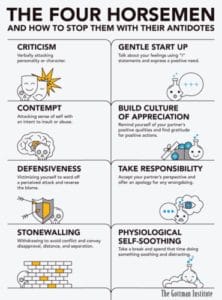
In this article, we’ll identify the Four Horsemen and how to work your way around it.
The Four Horsemen in a relationship is a reference not to the Biblical story but instead of the four major obstacles that can ruin a relationship. Often one or all four of the horsemen will surface during conflict discussions, and it becomes essential to eliminate them by ideally replacing them with something more productive.
Criticism
There are going to be things that annoy you about your partner. Criticism that tears a relationship apart is when you are attacking your partner’s character and pointing out flaws. You might proclaim about your partner in an extreme sense or absolute terms. One of the ways to identify this issue is if you catch yourself using terms like “Always” or “Never.”
A Constructive Alternative
It’s fine to voice concerns and complaints, but you will want to do it in a way that focuses on your feelings and how your partner’s behaviour may affect you. Use “I” statements like “I feel alone when we cannot have dinner together, I need more times where we can eat together,” Instead of “you’re never around at dinner time.”
A good structure to use is I feel…. About…. I need…
Contempt
Contempt is deemed the worst of the 4 because it often places the recipient in a position of being condescended on her made to feel like they have a character defect or flaw. Contempt happens to be a lot more destructive as compared to other forms of criticism because it mainly involves treating your partner with disgust, disrespect, ridicule and condescension. Often a partner will hurl mean sarcasm, sneering, eye-rolling. Over time this contempt may grow, causing the person to focus mainly on what they dislike in their partner. This can be destructive to your partners self esteem and cause resentment to build.
A Constructive Alternative
Instead of keeping up with all the flaws, you might want to focus on their positive qualities and things you love about them. It might help if you make a list of all the qualities you like and return to that list as a reminder when you’re feeling negative towards them. What if you were to focus on the things that they do well instead of the things they do not do so well.
Defensiveness
Usually, when a partner feels criticized, they will become defensive. It will involve making excuses in order to avoid taking responsibility, or they might even deflect blame onto the other partner. If the words “I didn’t do anything wrong” come out of your mouth after a complaint has been levelled, you need to stop and think if that’s the case. The other time is when you say something like, “I completely understanding you, but….” And then you state why their opinion is not correct.
When we get defensive in relationships it could often send the message to the other person that you’re not listening or taking their concerns seriously. Remember validating the other persons perspective does not mean you agree.
An Alternative to Defensiveness
You will want to take the time to hear what your partner has to say and take responsibility. An apology does not hurt and can help your relationship.
Stonewalling
Stonewalling can often happen when you feel what’s called emotionally flooded. Putting up a metaphorical wall between yourself and your partner means you’re shutting them off—possibly distancing yourself both emotionally and physically. One instance of this is to give them the “silent treatment” or leave without telling them where you are going. Usually, when the first three horsemen accumulate, they can result in this fourth horseman surfacing. Stonewalling is destructive to a relationship since it makes your partner feel rejected and abandoned.
Alternative to Stonewalling
One of the best antidotes to this is to use what is called physiological self-soothing. If you want to take some time to collect your thoughts, let your partner know about it and take that time to calm down until you are ready to talk about the issue. One of the reasons why people stonewall is often because their emotions are overwhelmed. If you let the other person know you are taking a 30 minute time out, they will understand that you want to take care of yourself and aren’t rejecting them.
If you can see any of the four horsemen in your relationship or would like some help with your relationship, you can learn more about our couples and marriage counseling here: www.imentalhealth.ca/couples-counselling-st-albert/, www.imentalhealth.ca/marriagecounselling/ or reach out to me via the form below.






If you are unsure of which service area to book, you can simply book an individual or couples appointment and specify with your therapist in your intake what it is you are wanting to work on. Our categories are a way of helping explain our approach to different presenting issues. It is also not limited to these areas. Also if you are in need of immediate support please call the distress line or 811 to reach someone immediately. Thank you for visiting our site.